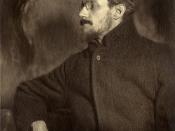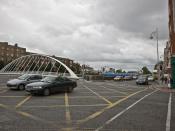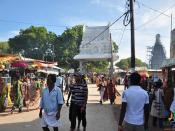In his brief but complex story "Araby," James Joyce concentrates on character to reveal the ironies within self-deception. To some, "Araby" is a story of initiation, of a boy's pursuit for the ideal. The pursuit ends in failure but results in an inner awareness and a first step into manhood. The story also consists of a grown man's remembered experience, a man who looks back to a particular moment of his life where he was blinded by illusions, as he tells the story from an adult perspective. Though reality can sometimes be mistaken by illusion set forth by our own minds, as individuals, we should liberate our souls of the vanity that we foster. In this short story we are presented the life of a boy who seems to have mistaken his "puppy love" towards a girl, for something he soon realizes he was wrong about.
The boy's life is shown through the past and present of his illusions and reality he is now facing.
The story starts off by describing the main character as "being blind", an illusion which is the condition of the boy's reaction to reality, yet the story ends with the boy seeing, "Gazing up into the darkness I saw myselfâ¦" the boy's realization to the reality he should see rather than the illusion he had been living. The girl is described, "her figure defined by the lightâ¦and I stood by the railings looking at her" it is as if she is an illusion or a dream. Throughout the story we see symbols and images that remind us of the church or religion in general, and perhaps this "image" and description of the way the boy sees the girl may represent the Virgin Mary, a holy figure.
The boy was obviously not in love with the girl when Joyce explains "Remembering with difficulty why I had come" the boy is confused and it is the beginning of his epiphany towards his reader-awaited realization. If the boy were truly in love with the girl, he would not have had trouble remembering why he was there in the first place. The illusion that she is perfect in his eyes will soon be unshielded to see the true reality. When the girl asked the boy if he was going to the bazaar, she said it would be a splendid bazaar, and she would love to go. At this point, as she is talking to the boy, Joyce emphasizes that the girl "turned a silver bracelet round and round her wrist" this shows that the girl is nervous, perhaps because she has the same feelings towards him, or she is just simply flirting with him. The quest ends when he arrives at the bazaar and realizes with slow, tortured clarity that Araby is not at all what he imagined. It is empty and dark. The boy realizes that he has placed all his love and hope in a world that does not exist except in his imagination. He feels angry and betrayed and realizes his self-deception. He feels he is "a creature driven and derided by vanity" and the vanity is his own. His feelings had taken him to a world of the imagination and let him wake to the very real world of fact.
The apple tree in the "wild garden" at the beginning of the story "brings to mind the Garden of Eden" and foreshadows the boy's shattering realization because, Adam through his love for Eve ate the fruit of the tree and was cast from Paradise into the world of reality. Overhearing the woman at the bazaar talking to two men exposes him to "the petty reality of ordinary flirtation, crushing his romantic dreams" The boy in "Araby" starts out believing he is in love for the first time but winds up hating himself for having behaved foolishly.
In all, we can see that illusion and reality can sometimes be mistaken and often it takes us to realize which is which.
The boy always saw the girl as a religious image, but when he attends the bazaar and he sees what kind of a place it is, dark, and empty, he realizes that he was caught up in his own vanity, from the reality he couldn't see.
The boy's house had once been inhabited by a charitable priest who had died in the back room of the house. The beginning of the story describes the room in which the priest had died and how it was "littered with old useless papers". He also describes a book and "its leaves were yellow". The boy found the priest's old "rusty bicycle pump". All these that James Joyce writes, shows the reader of these "past" objects and the reality of them today. The "old useless papers" seem unworthy today, but they must have been useful when the priest had them. Or when he describes the leaves of the book yellow, they were once new and white. The bicycle pump had also been new once, now that it has been used, over the years it has rusted. When the boy asked his aunt if he is able to go to the bazaar, she immediately asked him if it was some "Freemason affair". This shows the contrast between the aunt and the girl.





